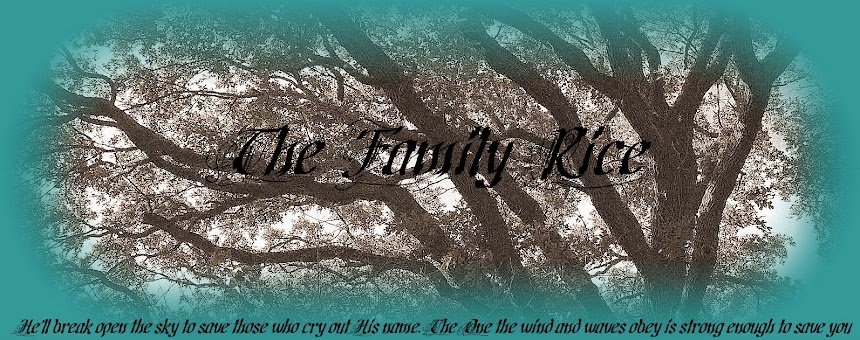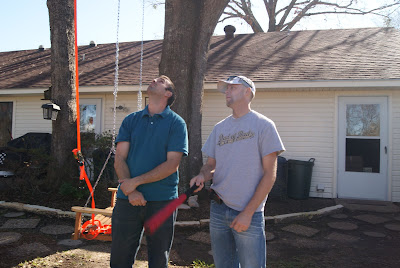
Tuesday, February 28, 2012
Caleb's 6th Birthday

Sunday, February 05, 2012
Book Review
A dark power is at work, intent on gaining complete control of the Cradleland – the birthplace of the still young world. All that stands in the Power’s way is one troublesome line of humans: the descendants of Seth. They are of the only remaining clan clinging to an all-but-dead faith. And yet it’s from that faith that a prophecy threatens all plans of world dominion – a promise, spoken from the heart of Eden, warning of a human son yet to come who would strike back with a crushing blow. The darkness is determined to stop that from happening. This redeemer must be born of a human, so an incredible scheme is launched to prevent the prophecy from coming to pass. First, pollute the human bloodline; and second . . . kill the only one who could be humanity’s deliverance!
My thoughts:
Isn't it true that ever since the Fall, mankind has consistently been falling farther and farther away from God? Can you even imagine what it must have been like to walk with God? I can't either. It seems so foreign, like a legend. That's how the people in this book regarded God, whom they call the Creator. It had been about 1000 years since the world was created, however only 3 or 4 generations had passed. That's how quickly they had forgotten. You've heard of Methuselah, yes? The famous "oldest guy in the Bible" guy? 969 years he lived. That was normal then. Now go read about Methuselah's relatives in Genesis 5 and 6. They all lived a good 500-700 years. Had dozens of children, and watched several generations grow up before they themselves were considered old. In this story, Mishah is pregnant with her first child, and is over 100 years old already. Her Grandmother, Amolikah, is healthy enough to make a pilgrimage into the Wild Lands with her granddaughter, and does so with a gleam in her eye. 80-year-old men were considered young and inexperienced at life. The customary wedding price for a bride was 127 years of working for the bride's father. Then the newlyweds could settle down and start a family. Mishah's apprenticeship as a healer was 18 years. These are details the author describes, which are based on Biblical accounts of very long lives of early humans.
The main story in the book is about Mishah, wife of Lamech, who embarks on the traditional pilgrimage to visit the Mother during the pregnancy of her first child for a blessing and prophecy. With them are Amolikah, her grandmother, Kenock, her "young" (80ish) brother, and Kleg'l, the family's good-man. He is the keeper of the family's finances, and is voluntarily bound to them by oath. They are Lee-landers from Morg-Seth. They are considered clannish, intolerant, and outspoken about their religion by most other people in the known world. Their journey takes them through Nod City, which is the crowning glory of the known world. The most modern and advanced society so far, which reminds me much of today in many ways. The government propaganda stresses tolerance of all lifestyles. The state religion is that of the Oracle, and his earthly representative is called the Lodath, and his name is Sol-Ra-Luce (hmmm, words that allude to sun/light, the sun god, and Lucifer..). The Oracle's Lodath speaks of peace and love and tolerance.
Mishah and Lamech, however, cling to the ways of what the Lodath calls the Tyrant of Old; the Creator. Lamech is the grandson of Enoch, the very same Enoch who was a descendent of Seth, son of Adam and Eve. Enoch, who walked with God and wrote down the things he learned and passed them down the generations of his tribe. Lamech inherited Enoch's zeal for proclaiming the truths of the Creator, and this causes trouble for him in Nod City. He is detained there, and insists his family continue on the pilgrimage without him. Trust the Creator, he says.
While in Nod City, the family meets a man named Rhone. He is a quiet man, but enormous in size and strength. He is a Webmaster by trade, which means he possesses the ability to communicate with large spiders, convinces them to give him their webs, and he leaves a gift for them. The web is used for making cloth and other items used in the civilized society. Did you know that man may have once had the ability to communicate with animals? Think back to the garden of Eden. Do you think it was strange that Eve was speaking to a serpent? Does it make more sense that speaking to the animals might have been normal, and that's why she didn't shy away when a serpent starting speaking to her? In the Garden, everything was as God imagined it. How do we know that communication among His created species was not a part of it? In the instant that Adam sinned, creation began to fall apart. In this book, that included the perfect harmony between human and animal. Very few humans still possessed the ability - a gift, really - to connect with animals. In fact, an over-reaching danger throughout the book is the humans' fear of turnlings, or animals that had turned on humans and had begun attacking them.
Through a series of circumstances that only a fiction book can provide, the family crosses paths with Rhone and his young (again, 80ish) apprentice, Bar'ack. They begin to travel together, with the family employing Rhone to guide them and protect them from rogues in the Wild Lands. Rhone struggles throughout the book with his religious allegiance. He is from Nod City, but is skeptical of the Oracle, as well as wary of the Lee-landers. He struggles with these feeling throughout, but he is protected by an unseen messenger, and eventually chooses sides.
Until now I haven't mentioned the messengers. But they play a very important part in the story. The Lodath is the human vessel of the Oracle, with a human army, but the Oracle also employs his army of un-shackled ones. They contend with the shackled-ones, those who haven't yet freed themselves from the shackles of the Tyrant of Old. Let me give you a hint: The Oracle is Lucifer. About halfway through the book, the author stops referring to him only as the Oracle, after most readers have figured out who he really is. There are also half-breeds. They are called Earth-Born, and they are the seeds of the un-shackled ones and humans. They are giants with super-human abilities, also referred to as Nephilim. (Goliath, anyone?) It seems Lucifer has an unstoppable force that spans two dimensions!
But there are also messengers for the Creator. The shackled-ones, as called by the demons. The terms angels and demons are never used, but it is easy to know the difference. The Creator's messengers protect Mishah and Rhone throughout the book. At first it is not understood exactly why Mishah is so important, but there is a prophecy which involves the child she carries, whom is a descendent of Seth. The line of Seth is very important.
When Lucifer reveals to Sol-Ra-Luce the prophecy and his fear of Mishah and the child she carries, and all-out manhunt ensues with orders to kill her, and her child. Her child means Lucifer's defeat. Her child means the Tyrant wins. Again. He must get rid of her. All realms are brought in to the conflict.
Eventually, Misha's makes it to the Mother, who is, you guessed it, Eve herself. The Mother of all Living. She is over 1000 years old, and very frail, but still sharp-minded as ever. She is a sad woman, but has hope. She knows she has been forgiven and has a home with the Creator and Adam, who has already gone home. She knows her children, and grieves and rejoices in them. Eve knows of the pursuit of Mishah and sends her to find refuge in the Cradleland. The Garden of Eden itself. It is so much forgotten by most humans by now, barely anyone knows the way. It is the place of ruin, and apart from the actual garden, which is guarded by terrifyingly large cherubim, it is utterly barren. The group makes their way there, all the while being pursued by the Lodath's guard and the Earth-born giants. The end is a thrilling race against time, ending with the reader getting to experience the inside of the Garden of Eden and meet the Gardener. The Gardener, who has been waiting for Mishah and her son. The Gardener, the human embodiment of the Creator Himself. We get to witness the birth of Mishah's son. Her son, who has been prophesied about. Her son, whose name is to be called Noah.
I loved this book. It is so fun to think about earlier civilizations and the stories that might have happened. It helps to understand the Bible more, when you understand some things about the people and time period. Much is not known about the time before the Flood, and one should not forget that this book is most definitely a work of fiction, but there are many truths that can be discovered as well. I can not wait to dive in to book two, which follows Rhone's story more and weaves him more deeply into the storyline.




















